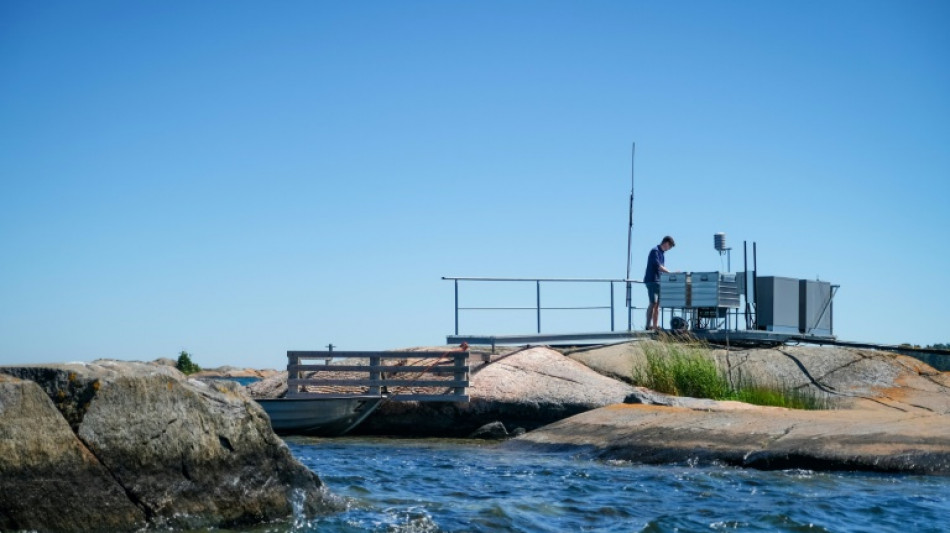
-
 N. Korea to hold party congress in February, first since 2021
N. Korea to hold party congress in February, first since 2021
-
Thailand votes after three leaders in two years

-
 Swiss joy as Von Allmen wins first gold of Winter Olympics
Swiss joy as Von Allmen wins first gold of Winter Olympics
-
George backs England to 'kick on' after Six Nations rout of Wales

-
 Malinin upstaged as Japan keep pressure on USA in skating team event
Malinin upstaged as Japan keep pressure on USA in skating team event
-
Japan's Kimura soars to Olympic gold in snowboard big air final

-
 Vail's golden comets Vonn and Shiffrin inspire those who follow
Vail's golden comets Vonn and Shiffrin inspire those who follow
-
Veteran French politician loses culture post over Epstein links

-
 Japan's Kimura wins Olympic snowboard big air gold
Japan's Kimura wins Olympic snowboard big air gold
-
Arteta backs confident Gyokeres to hit 'highest level'

-
 Hojlund the hero as Napoli snatch late win at Genoa
Hojlund the hero as Napoli snatch late win at Genoa
-
England's Arundell 'frustrated' despite hat-trick in Wales romp

-
 Lollobrigida skates to first Italian gold of Winter Olympics on her birthday
Lollobrigida skates to first Italian gold of Winter Olympics on her birthday
-
Arundell hat-trick inspires England thrashing of Wales in Six Nations opener

-
 Chile's climate summit chief to lead plastic pollution treaty talks
Chile's climate summit chief to lead plastic pollution treaty talks
-
Rosenior hails 'unstoppable' Palmer after treble tames Wolves

-
 French ex-minister offers resignation from Paris cultural hub over Epstein links
French ex-minister offers resignation from Paris cultural hub over Epstein links
-
New NBA dunk contest champ assured and shooting stars return

-
 Shiffrin says will use lessons learnt from Beijing flop at 2026 Games
Shiffrin says will use lessons learnt from Beijing flop at 2026 Games
-
Takaichi tipped for big win as Japan votes

-
 Lens return top of Ligue 1 with win over Rennes
Lens return top of Ligue 1 with win over Rennes
-
Shiffrin learning from Beijing lessons ahead of Milan-Cortina bow

-
 Demonstrators in Berlin call for fall of Iran's Islamic republic
Demonstrators in Berlin call for fall of Iran's Islamic republic
-
'Free the mountains!": clashes at Milan protest over Winter Olympics

-
 Townsend accepts pressure will mount on him after Italy defeat
Townsend accepts pressure will mount on him after Italy defeat
-
BMW iX3 new style and design

-
 Suryakumar's 84 leads India to opening win over USA in T20 World Cup
Suryakumar's 84 leads India to opening win over USA in T20 World Cup
-
Lollobrigida skates to first Italian gold of Milan-Cortina Games

-
 Barca beat Mallorca to extend Liga lead
Barca beat Mallorca to extend Liga lead
-
Gyokeres lifts Arsenal nine clear as Man Utd pile pressure on Frank

-
 Late Guirassy winner for Dortmund trims Bayern's lead atop Bundesliga
Late Guirassy winner for Dortmund trims Bayern's lead atop Bundesliga
-
'Free the mountains!": protest in Milan over Winter Olympics

-
 Gyokeres double helps Arsenal stretch Premier League lead
Gyokeres double helps Arsenal stretch Premier League lead
-
New Skoda Epiq: modern with range

-
 Six Nations misery for Townsend as Italy beat sorry Scotland
Six Nations misery for Townsend as Italy beat sorry Scotland
-
Spain, Portugal face fresh storms, torrential rain

-
 Opinions of Zuckerberg hang over social media addiction trial jury selection
Opinions of Zuckerberg hang over social media addiction trial jury selection
-
Over 2,200 IS detainees transferred to Iraq from Syria: Iraqi official

-
 Norway's Ruud tops Olympic men's freeski slopestyle qualifying
Norway's Ruud tops Olympic men's freeski slopestyle qualifying
-
Czech qualifier Bejlek claims first title in Abu Dhabi

-
 French duo reach Shanghai, completing year-and-a-half walk
French duo reach Shanghai, completing year-and-a-half walk
-
Australian snowboarder James eyes elusive Olympic gold

-
 Sequins and snow: Eva Adamczykova makes Olympic return
Sequins and snow: Eva Adamczykova makes Olympic return
-
Vonn set for Olympic medal bid after successful downhill training

-
 Shepherd takes hat-trick as West Indies beat Scotland in T20 World Cup
Shepherd takes hat-trick as West Indies beat Scotland in T20 World Cup
-
Sausages will sell after thrill-seeker Von Allmen wins Olympic downhill

-
 Swiss racer Von Allmen wins first gold of Winter Olympics
Swiss racer Von Allmen wins first gold of Winter Olympics
-
'Wake up': Mum sparks comeback after scare for freeski star Gu

-
 Von Allmen wins men's Olympic downhill gold, first of Games
Von Allmen wins men's Olympic downhill gold, first of Games
-
First medals up for grabs at Winter Olympics


Warming Baltic Sea: a red flag for global oceans
Climate change combined with pollution from farming and forestry could flip northern Europe's Baltic Sea from being a sponge for CO2 to a source of the planet-warming gas, scientists studying told AFP.
This should be a red flag, they warned, noting that other coastal marine zones around the world are trending in the same direction.
"We are at the forefront of these changes," said University of Helsinki professor Alf Norkko.
The Baltic Sea –- connected to the Atlantic by the straights of Denmark, and surrounded by Germany, Poland, Finland, Sweden and the Baltic states –- has warmed at twice the pace of global oceans generally.
Its relatively shallow waters are extremely sensitive to changes in the environment and climate.
AFP recently accompanied Norkko, who leads the largest marine research station in the Baltic Sea, and some of his colleagues on a research excursion to the Finnish waterfront town of Hanko.
Slender terns dart above the lush marsh-like landscape surrounding the over 120-year-old field station, a common sight along Finland's 1,100-kilometre (680-mile) coastline, which is dotted by more than 81,000 islands.
Measurements conducted since 1926 show that average sea temperature have spiked by two degrees Celsius over the last 30 years.
"The Baltic Sea is basically a small bathtub compared to the global oceans," said doctoral researcher Norman Gobeler, an expert on marine heatwaves.
"We are seeing the first effects of the temperature increase."
- Linking marine ecosystems to climate change -
During one foray into the field, coastal ecologist and doctoral researcher Margaret Williamson –- sporting waist-high waders and sunglasses –- moved through a swaying, green reedbed collecting stems, roots and soil to measure CO2 levels.
"The Baltic Sea is really important for understanding what climate change is doing worldwide," said Williamson, who is part of a joint research project with Helsinki and Stockholm universities.
Many coastal areas across the globe -- coral reefs, estuaries, and mangrove forests –- are among the planet's richest biodiversity hotspots, providing vital nurseries and habitats for hundreds of marine species.
They are also the most vulnerable to the kind of changes observed in the Baltic.
Up to now, oceans have been our most important natural ally in coping with global warming.
Over decades, they have consistently absorbed 90 percent of the heat generated by human-induced climate change, and about a quarter of the carbon dioxide humanity injects into the atmosphere.
But scientists say there is a lot we do not know about the capacity of oceans to continue serving as "sinks", or sponges, for our carbon pollution, Norkko noted.
"There has been a lot of emphasis on terrestrial forests' role as carbon sinks," he said. "Our coasts and oceans have been ignored. The question is, how much further the oceans can take of all these stressors?"
- From carbon sink to carbon source? -
Recent findings from the Finnish research station suggest coastal ecosystems in the Baltic Sea could start emitting greenhouse gases –- CO2 and methane –- instead of absorbing them, driven by both rising temperatures and environmental pollution.
The ecological condition of many coastal areas has deteriorated due to the runoff from forestry and nitrogen and phosphorus-rich fertiliser used in agriculture, as well as untreated waste water.
The overabundance of chemical nutrients leads to harmful algae blooms, and vast "dead zones" depleted of oxygen, a process known as eutrophication.
"A degraded ecosystem will be a net carbon source," Norkko said. "Our biggest concern is that what should be an efficient carbon sink could become a carbon source."
Norkko said the changes already witnessed in the Baltic Sea should sound the alarm for coastal regions across the world.
"Many of the world's densely populated coastal areas are affected by eutrophication and this has a huge effect on the ability of coastal ecosystems to mitigate climate change," he said.
While measures to protect and restore healthy marine ecosystems had been taken in the Baltic Sea and elsewhere, ramped up efforts are required to ensure their role as carbon absorbers.
Pointing to the dark green, bubbly bladderwrack -- a threatened seaweed that anchors coastal marine ecosystems –- Norkko compared the algae with an "old growth forest", noting it lives up to 30 years in a robust coastal ecosystem.
"Once the bladderwrack sucks up carbon it stores it for a long time," he said. "That's why a healthy system is a buffer against change and is important to maintain."
E.Qaddoumi--SF-PST




